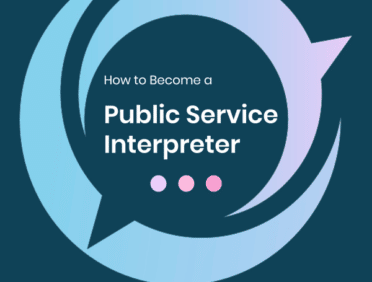How to Become a Paid Law Enforcement Interpreter?
Becoming a law enforcement interpreter is a rewarding career path for those who are fluent in multiple languages and possess exceptional communication skills. As a law enforcement interpreter, you’ll be responsible for bridging the communication gap between law enforcement agencies and non-English speaking individuals. In this blog, we’ll take a look at the steps required to become a paid law enforcement interpreter.
How do I become a police interpreter?
The first step towards becoming a law enforcement interpreter is to ensure that you meet the qualification requirements. Different law enforcement agencies have varying qualifications, but the majority of agencies require that interpreters have a recognised interpreting qualification, such as the Level 6 Diploma in Public Service Interpreting (DPSI). If you are new to interpreting, you are advised to start with a Level 3 Certificate in Community Interpreting and gain professional experience before attempting a level 6 qualification, due to the difficulty of achieving a Level 6 qualification without any experience or lesser qualifications.
Can a police officer act as an interpreter?
Police officers are not usually trained to interpret languages, and therefore, it is not recommended for them to act as an interpreter. In addition, it could distract the officer from their primary role or cause issues with impartiality if they try to act as interpreter as well as officer. Finally, all interviews etc. in the UK must take place in English so that the evidence can be understood by others so a police officer in the UK would not be able to interview anyone in another language even if they have the necessary skills and training. Using a qualified interpreter ensures accurate and unbiased communication between law enforcement and non-English speaking individuals.
Interpreting best practice
Interpreting best practices require interpreters to be impartial, confidential, and transparent in their communication. They must ensure that they communicate accurately and faithfully, without adding or omitting any information. Interpreters must avoid providing any advice or making assumptions, and instead, stick to conveying the message accurately.
Who can become an interpreter for the Law Enforcement?
To become a law enforcement interpreter, you must have excellent communication skills, be fluent in two or more languages to level C1 or above on the Common European Framework for Languages (CEFR), and possess relevant qualifications and experience. As mentioned, the majority of law enforcement interpreters will have a qualification, ideally a Level 6 DPSI or equivalent, and experience.
Step 1: Qualifications
Deaf and Deafblind people (NRCPD)
The National Register of Communication Professionals working with Deaf and Deafblind People (NRCPD) offers advice for Deaf and Deafblind individuals to become interpreters. Qualifications include those offered by Signature. This is not really an area of our expertise so we wont go into too much detail about Deaf and Deafblind qualifications in this blog.
Chartered Institute of Linguists (CIOL)
The Chartered Institute of Linguists (CIOL), founded in 1910, is the UK’s Royal Charter body for language practitioners. They aim to enhance the recognition and promote the value of languages and language skills in the public interest. CIOL has over 5,000 professional members worldwide and more than 1,500 affiliates.
CIOL provides qualifications for interpreters and translators, including the Diploma in Public Service Interpreting (DPSI) which is the oldest and most recognisable interpreting qualification of its type. Other organisations also run DPSI qualifications such as DPSIOnline and may offer additional languages.
The DPSI is a professional qualification awarded by the CIOL. The full DPSI (Units 01-05) can be taken in June. In November they offer the full DPSI (Units 01-05) for the Law pathway only and only written units (Unit 04 and Unit 05) for all other pathways.
Part 1: two way (consecutive) and simultaneous legal interpreting role play
Part 2: legal sight translation from English
Part 3: legal sight translation to English
Part 4: legal draft written translation from English
Part 5: legal draft written translation to English
You are strongly recommended to take a preparation course, such as the Learn Q Level 6 Diploma in Public Service Interpreting (DPSI) Preparation Course before attempting the exam.
As mentioned, this level is not recommended for beginners, so if you are new to interpreting you will be better to start at Level 3.
If there is no Level 6 qualification available in your language combination, you may be able to qualify through an ‘equivalent’ qualification plus experience, or a lower level interpreting qualification plus experience. The criteria for this changes relatively often so this blog will not contain any examples.
The DPSI can be undertaken in either law, health, or local government but the most useful version for law enforcement interpreting is, of course, Law. This will include information on the legal specialism so it is more useful for interpreters wishing to specialise in that field.
General Expectations
In addition to the above qualification, or an equivalent, law enforcement agencies expect interpreters to have excellent communication and interpersonal skills, cultural awareness and sensitivity, and to be professional in their conduct. There is usually also an expectation for interpreters to have professional interpreting experience and have a wide knowledge of the legal specialism.
Broadly speaking there are 3 main areas of skill and knowledge that interpreters must be proficient in: language, subject matter, and interpreting skills.
At level 6, interpreters need to be able to speak, read and write in both languages.
Institute of Interpreting and Translation (ITI)
The Institute of Interpreting and Translation are not a qualification provider, but are the only UK-based independent professional membership association for practising translators, interpreters and all those involved in supplying language services. ITI seek to promote the highest standards in the profession, supporting their members and representing the industry at the very top level.
Being a member of ITI will not necessarily help or hinder your goal of being a law enforcement interpreter so it is very much a personal choice as to whether you join or not. It is advisable to weigh up the pros and cons of joining (including the membership fee) and deciding if the benefits are worthwhile for yourself.
National Register of Public Services Interpreters (NRPSI)
The NRPSI is the UK’s independent voluntary regulator of professional interpreters specialising in public service. They maintain a public register of professional, qualified and accountable interpreters. The National Register is free of charge to access and searchable online.
As with the ITI, although registration with The NRPSI can help you to find work, it is not a prerequisite and is not guaranteed to help you find more opportunities so you are advised to weigh up the benefits of joining before doing so.
Non-Police Personnel Vetting (NPPV) Level 3
The NPPV is a national security clearance that is required for those working in law enforcement. To become a law enforcement interpreter, you’ll need to obtain NPPV Level 3 clearance. For this and other clearances, you will often get sponsored by the Language Service Provider (LSP) that you are working for. It is not always possible to get security clearances prior to working with organisations that require it.
Step 2: Prerequisite Requirement
Before applying to become a law enforcement interpreter, you must meet certain prerequisites:
- You must be at least 18 years old and have a clean criminal record.
- You must also have the legal right to work in the UK.
- If it is available in your language, you would need a relevant Level 6 qualification for each language combination that you wish to work in
- If a Level 6 qualification is not available in your language combination, a lower level or equivalent qualification is usually needed
- You are likely to need proven experience as a professional interpreter
- Your language skills in both languages will need to be C1 or higher on the Common European Framework for Languages (CEFR).
Step 3: Skills and Knowledge
Broadly speaking there are 3 main areas of skill and knowledge that interpreters must be proficient in: language, subject matter, and interpreting skills.
Language
Interpreters need to be highly skilled in language first and foremost. Interpreters need to be fluent in both languages that they will be interpreting from and into so that they can accurately render what is being said with no loss of meaning. They are expected to be able to:
- interpret the meaning of the communication in both languages
- interpret everything that is said accurately without adding anything to the message, or leaving anything out
- interpret fluently with the correct sentence structure
switch confidently between both languages, and
- convey meaning even if there is no direct equivalent in the target language
At level 6 interpreters need to be able to speak, read and write in both languages to a high level.
Subject matter
Even when somebody is fluent in a language, they are unlikely to know all the specialist terminology that an interpreter needs to use in their daily assignments. This means that interpreters must revise subject specialist vocabulary and build up glossaries to help them with their assignments. Interpreters are expected to be:
- familiar with the subject matter, environment and roles of the setting
- knowledgeable about the cultural differences between the conversation participants
- able to render complex language, specialist terminology and jargon between languages
In the case of law enforcement interpreting, you will need an excellent understanding of the UK justice system and terminology including courts, police, probation and home office. You would also be expected to have an understanding of the equivalent systems in the countries where your other language is spoken.
Interpreting skills
Professional interpreters have a number of guidelines that they are expected to follow in terms of interpreting skills, and these skills are designed to ensure the interpreting provision is risk free for all participants. Essential interpreting skills include:
explaining the interpreter role so participants know what to expect
- facilitating effective conversation
- using the correct type of interpreting
- following the interpreter code of conduct
- being clear, audible and understandable throughout
- ask questions and check meaning when needed, and
- accurately reflect the register, tone, intonation, speed plus any intention, attitude, irony, sarcasm or innuendo of the original message
A competent Level 6 preparation course will explain all the above in more detail.
For law enforcement interpreting, you will need to be proficient in all of the following interpreting ‘modes’:
Consecutive interpreting involves participants taking turns to speak, with pauses in the conversation for the interpreter to provide translations. In sight translation from English, an interpreter is asked to read a document in the source language and translate it into the target language. This is commonly used when a patient with limited English proficiency needs to understand a document but a translation is not available in their first language.
During sight translation, the interpreter is given time to read and interpret the text before speaking it aloud in the target language. The most frequent request for sight translation in the UK is for documents written in English. Conversely, in sight translation to English, an interpreter is asked to translate content from a document in a language other than English into English.
Simultaneous interpreting occurs when an interpreter translates a conversation into the target language at the same time as the source language speaker is speaking. This skill is mainly used in court interpreting and conference interpreting when speeches are being delivered. As simultaneous interpreting is a challenging skill, interpreters usually work in pairs during longer sessions, and each interpreter takes a break after a maximum of 20 minutes.
During whispered interpreting or chuchotage, the interpreter sits close to the listener and provides a whispered interpretation of what is being said. In contrast, booth interpreting involves delivering interpretations via microphones to delegate earpieces.
In the context of the UK Home Office, written translation is the process of translating written documents from one language to another, such as a passport or visa application, a legal document, or a letter. This is distinct from interpreting, which involves verbal communication, however, written translation is an important service provided by the Home Office to ensure that non-English speaking individuals are able to access and understand official documents and information.
All of the above skills and knowledge requirements are thoroughly tested in the DPSI exam.
Step 4: Languages in Demand
There can be a lot of flux in demand for interpreting languages over time. It can often depend on factors including:
- How commonly spoken a language is in the country or in a particular region
- Migration trends
- Current events
- The current number of interpreters available in a particular language
For instance, when Russia invaded Ukraine in 2022, a large number of people migrated to the UK from Ukraine. This meant that there was suddenly a large increase in the number of people who spoke Ukrainian in the UK, and there weren’t enough qualified Ukrainian interpreters to cover the need, so the language was in demand.
Generally though, the requirement for interpreters stays relatively stable, with trends emerging over time but some languages are consistently in demand and are closely linked to the numbers of the UK population who speak a particular language. At the time of writing, the most popular interpreting languages in the UK are:
- Polish
- Punjabi
- Urdu
- Bengali
- Gujarati
- Romanian
- Arabic
- Chinese (Mandarin and Cantonese)
- Portuguese
- Spanish
If you’re fluent in a language that has a lesser number of interpreters available – known as a ‘rare’ language – such as Basque, Gaelic, or Xhosa, for example, you may still have opportunities to work as a law enforcement interpreter. In some cases, law enforcement agencies may have difficulty finding qualified interpreters for these languages, so having proficiency in a rare language can be an advantage.
It can be more difficult to gain a qualification in ‘rare’ languages, so often the criteria for working as an interpreter will be different. This could include having a similar language qualification, a lesser interpreting qualification such as the Level 3 Certificate in Community Interpreting and having worked a certain number of hours as a professional interpreter. The criteria will often differ depending on the law enforcement organisation.
Step 5: Daily Roles and Responsibilities
As a law enforcement interpreter, you’ll be expected to perform a wide range of duties on a daily basis. You may be asked to interpret for suspects, witnesses, victims, and law enforcement personnel during interviews, investigations, and court proceedings. You may also be required to translate documents, such as police reports and legal documents, and assist in the preparation of reports and other paperwork.
Daily tasks for an interpreter may include:
- checking their schedule to prepare for upcoming assignments
- noting the location of each appointment
- arranging travel for in-person assignments to ensure they arrive on time
- fulfilling pre-booked interpreting assignments
- adhering to the interpreter code of conduct
- keeping interpreting agencies informed of any necessary information
- accepting on-demand telephone or video remote interpreting calls
- using technology such as websites and smartphones to accept additional job opportunities
- taking note of unfamiliar terminology during assignments and researching it for future use
- completing Continuing Professional Development (CPD) activities to enhance their skills and knowledge
- NRPSI Code of Conduct
As a professional interpreter, you’re expected to abide by certain codes of conduct. The National Register of Public Service Interpreters (NRPSI) has established a code of professional conduct that outlines the ethical and professional standards that interpreters should follow.
This code includes principles such as maintaining impartiality, respecting confidentiality, and striving for accuracy and completeness in all interpretations.
Professional interpreters all need to follow this, or an equivalent (organisatons sometimes have their own – such as the Ministry of Justice COC for interpreters who work with the MoJ. LSPs will often also have their own version), code of conduct.
Failure to adhere to the code of conduct can result in you getting barred from interpreting work.
Standard and behaviour of interpreters/LSPs
It’s also essential to maintain a high standard of behavior and professionalism in your work as a law enforcement interpreter.
This includes dressing appropriately, arriving on time, and demonstrating a high level of interpersonal skills.
As an interpreter, you’re representing both the law enforcement agency and the LSP you’re working for, so it’s crucial to conduct yourself in a manner that reflects positively on the agency and the profession.
The expectations of LSPs and service providers will differ, but as a rule of thumb you should adhere to business etiquette in appearance and behaviour, plus follow the relevant code of conduct as a minimum.
Step 6: Training and Up-skilling
Professional development is crucial in any field, and interpreting is no exception. To become a paid law enforcement interpreter, you’ll need to continually improve your skills and knowledge. This may involve taking additional courses or attending training sessions to stay up to date with the latest developments in the industry.
In addition, you will be expected to continually develop your skills and knowledge through the completion of activities including research and glossary development. This work is often ‘unpaid’ and time-consuming, so the role requires a lot of dedication.
Interpreting can be a solitary profession, requiring interpreters to engage in their own Continuing Professional Development (CPD) and practicing. While attending training courses is a common form of CPD, it is not the only way. Anything that helps improve skills or knowledge, such as reading, watching videos, practicing in front of a mirror or with family/friends, listening to podcasts, attending webinars, creating or revising glossaries, researching online, or watching relevant TV shows can all be considered CPD.
The key is to focus on useful tasks that will improve professional development, rather than wasting time on irrelevant activities. Structured CPD, where the desired outcome is defined in advance, is often the most effective. Completing a few minutes of CPD regularly can be more efficient than spending hours on tasks that won’t help improve skills. For example, revising obscure terms that are unlikely to come up in practical situations is not an effective use of time. By focusing on the outcome of CPD activities and how they will help improve skills, interpreters can make the most of their CPD and continually enhance their professional practice.
Step 7: Career Path and Progression
As a law enforcement interpreter, you’ll have several opportunities to advance your career and take on new roles and responsibilities.
Face-to-face interpreting
Face-to-face interpreting is the most common type of interpreting used in law enforcement. This involves interpreting in person during interviews, investigations, and court proceedings.
The skills interpreters will need for face to face interpreting include consecutive interpreting, simultaneous interpreting, sight translation and written translation.
On-Demand Interpreting / Telephone Interpreting / Video Remote Interpreting
Law enforcement interpreting involves providing interpreting services on short notice, often via telephone or video conference. This can be an excellent option for interpreters who prefer flexibility and /or can be available at a moment’s notice.
The skills interpreters will need for on-demand interpreting are mainly consecutive interpreting.
Telephone interpreting
Telephone interpreting is similar to on-demand interpreting, but the interpreter provides services over the phone. This type of interpreting can be unpredictable, with the interpreter given very little time to prepare for the next call or topic – so interpreters offering this service must have an excellent base knowledge.
Video Remote Interpreting (VRI)
Remote interpreting is becoming more prevalent in the law enforcement industry. This is mainly due to the convenience of technology, which enables remote communication through video or telephone calls. Remote interpreting is a cost-effective solution for law enforcement agencies that may not have an on-site interpreter. It also allows for quicker response times and more flexibility in scheduling.
There are a few different types of remote interpreting that can be used in the law enforcement industry. One of the most common types is video-link interpreting.
Video-link interpreting (VRI)
Video-link interpreting is an emerging field where interpreters can provide their services remotely using video conferencing technology. Video-link interpreting is becoming more common in legal proceedings, as it allows for remote interpreting without the need for the interpreter (or, in some cases, the other participants) to be physically present in the courtroom or police station.
Ensuring Interpreter Safety
In some interpreting sessions, such as in a highly emotional situation – some people may lash out in frustration or have difficulty controlling themselves. They may be threatened by the presence of someone that they do not know (e.g., the interpreter or service provider), or even just react to an accent or language if they connect it to disturbing or hurtful events in their past.
Interpreter safety is of utmost importance when working in law enforcement settings. Interpreters should be aware of the potential risks associated with interpreting in police stations and courtrooms and take appropriate measures to protect themselves.
This may include being accompanied by a security officer, wearing protective clothing, sitting in a safe location or having a duress alarm.
It is important for interpreters to be aware of the potential risks and take the necessary precautions to ensure their safety.
Payment for interpreting services
The earnings of a law enforcement interpreter in the UK can vary depending on several factors such as experience, qualifications, location, and language proficiency. Freelance interpreters in the UK can be paid between £17-£45 per hour for legal interpreting assignments (it’s important to note that despite often having greater qualifications and experience, interpreters qualified for law enforcement work when working on non-law enforcement assignments would be paid the rates for that work, rather than commanding higher fees). However, the actual rate may be higher or lower depending on the individual interpreter’s qualifications and experience and the work available.
Interpreters who work directly for law enforcement agencies or LSPs may receive a regular salary or hourly wage, which can range from £20,000 to £40,000 per year depending on their level of experience and qualifications.
It’s important to note that the demand for law enforcement interpreters in the UK can fluctuate, and interpreters may experience periods of high demand followed by periods of low demand. As a result, many law enforcement interpreters work on a freelance basis and supplement their income with other interpreting or translation work.
Step 8: Practicing and Keeping Up-to-date
Practicing as a law enforcement interpreter requires regular professional development and keeping up-to-date with changes in language and legal systems. The interpreter should constantly work on expanding their vocabulary, technical knowledge and legal terminology.
While some people think that Continuing Professional Development (CPD) is solely about attending training courses and obtaining certifications, this is not entirely accurate. While attending courses is a great way to earn CPD credits, there are other ways to improve your skills and knowledge, which count as CPD as well. For instance, reading helpful materials, watching videos, listening to podcasts, practicing your public speaking in front of a mirror, and even watching TV programmes or movies that relate to your profession or specialism.
International School of Linguists (ISL) offers a subscription-based CPD membership, which enables interpreters to complete CPD training online, as well as attend events. The CIOL also provide regular CPD events which can be useful for interpreters for a reasonable fee. It’s essential to note that anything that can help you enhance your professional abilities and knowledge can be counted as CPD. Structured CPD, which focuses on the specific outcomes you want to achieve, can be the most effective type of CPD. Therefore, it’s crucial to prioritise your CPD tasks and invest your time efficiently.
Completing CPD regularly, even if it’s just a few minutes at a time, is better than spending several hours on an activity that won’t be beneficial. It’s also essential to ensure that the tasks you undertake are relevant and useful to your profession. By focusing on the reason behind each CPD activity, you can measure your success and achieve your desired outcomes. Remember, anything you do to develop yourself as a professional can be counted as CPD.
Interpreters should also stay informed of any changes in the legal system, including laws, regulations, and court procedures. Keeping up-to-date with the latest legal and linguistic developments can help to maintain the quality of interpretation.
Step 9: Certification
The only real certification that an interpreter requires is the qualification so if you have studied a Level 6 Diploma in Public Service Interpreting and received your certificate for successfully passing the exam you can use this to apply for interpreting jobs.
At Level 6 you have to pass an exam for every language combination that you wish to interpret. This means, if you speak English plus two or more languages fluently and wish to work as an interpreter in multiple language combinations you would need to take multiple exams and achieve a certificate for each language that you wish to work in.
Step 10: Law Enforcement Interpreting Opportunities
There are several different law enforcement interpreting opportunities available for interpreters. Some of the most common ones are:
Legal Interpreter
Legal interpreter is another phrase for a law enforcement interpreter and perform the same role.
Court Interpreter
(Court-appointed interpreter for the purposes of taking instruction}
A court interpreter provides interpreting services in a court of law. Their main responsibility is to facilitate communication between a defendant and their legal team, including the judge, lawyers and witnesses. They may also interpret for victims, witnesses, and court staff.
Criminal Investigations Interpreters
Interpreters may be called upon to provide interpreting services in criminal investigations. They may be asked to interpret for suspects or victims of crime, or to interpret during interviews with police or other law enforcement officials.
Interpreter as a Witness in Court
An interpreter may also be called upon to give evidence in court as a witness. They may be asked to explain a conversation they previously interpreted or to provide expert witness testimony on interpreting issues.
Interpreters for Appellants
Interpreters may be used by appellants, individuals who appeal against a court’s decision, in hearings and trials.
Interpreter for a Defendant at Court
Interpreters may be called upon to interpret for defendants in court, ensuring that they fully understand the proceedings.
Interpreters for Police Assignments
Interpreters may be used by police officers in a variety of assignments, including questioning, raids and interviews.
Interpreters for Probation
Interpreters may be called upon to provide interpreting services in probation interviews and meetings.
Interpreter for a Witness at Court
Interpreters may be used to interpret for witnesses in court, ensuring that they can understand the questions asked and respond clearly.
Interpreters at the Police Station
Interpreters may be required to interpret for individuals detained by the police, including those who may not speak English as their first language.
Interpreter for obtaining a witness statement
Interpreters may be required to interpret when obtaining witness statements. When this is required, a police officer should always be present.
Police Interpreter
Police interpreters work closely with the police force to ensure that suspects and witnesses can communicate effectively.
Sign Language Interpreter
Another specialised area of interpreting is sign language interpreting. Sign language is a visual language that uses hand gestures, facial expressions, and body language to convey meaning, and is used primarily by individuals who are deaf or hard of hearing.
Sign language interpreting is a highly skilled and complex form of interpreting that requires extensive training and experience. Sign language interpreters must be fluent in sign language, as well as in the language of the audience they are interpreting for, which is often spoken language. They must also have a strong understanding of Deaf culture and the unique communication needs of the Deaf community.
Sign language interpreters work in a variety of settings, including schools, healthcare facilities, government agencies, and private businesses. They may provide interpreting services in-person, via video conference, or over the phone. Sign language interpreters must be able to adapt to different environments and situations, and must be able to maintain confidentiality and impartiality in all their interpreting work.
In order to become a sign language interpreter, individuals must undergo specialised training and gain a qualification in the sign language for the region they are providing services (sign language in different countries differ to each other). This may include completing a degree in sign language interpreting, as well as passing national certification exams. The National
Overall, becoming a sign language interpreter requires dedication, skill, and a passion for serving the Deaf community. It is a challenging and rewarding career path that offers the opportunity to make a real difference in the lives of others.
Conclusion
In conclusion, becoming a paid law enforcement interpreter requires a great deal of dedication and commitment. It is a highly demanding role that requires excellent language skills, cultural sensitivity, and the ability to communicate effectively with people from all backgrounds.
However, for those who are up for the challenge, it can be a highly rewarding and well paid career path.
To become a law enforcement interpreter, you will need to meet specific qualifications, gain the necessary experience and training, and be proficient in two or more languages in demand. You will also need to adhere to the NRPSI Codes of Conduct, maintain a professional standard of behavior, and ensure your safety at all times.
Once you have established yourself as a professional interpreter, there are many opportunities available to you in the law enforcement field. From court-appointed interpreters to criminal investigations, witness statements, and probation work, there is a wide range of roles that you can explore.
Ultimately, if you are passionate about language, culture, and communication, then becoming a law enforcement interpreter can be an incredibly fulfilling career choice. By following the steps outlined in this guide and investing in your professional development, you can achieve your goals and become a successful interpreter in the law enforcement field.
To download a .pdf of this blog, please click here
Useful Links
CACDP qualified interpreters:
Criminal and Financial Investigation (CFI):
Criminal Justice System:
Crown Prosecution Service (CPS):
CPS Guidance on Interpreters:
Immigration Enforcement (IE):
Office for Criminal Justice Reform:
PACE Code: (Police and Criminal Evidence Act 1984):
Police Approved Interpreters and Translators Scheme (PAIT):
Standard Operating Procedures (SOPs):
The European Court of Human Rights:
The National Register of Public Service Interpreters (NRPSI):
Chartered Institute of Linguists (CIOL)
Trafficking of Human Beings (THB):












